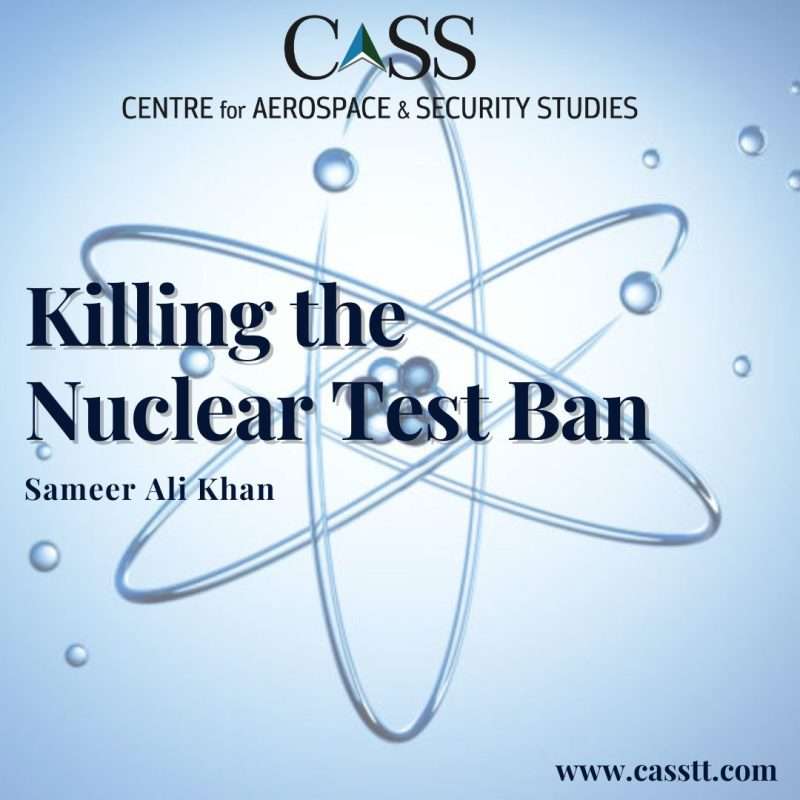On 18 October 2023, the Russian State Duma (lower house of parliament) voted unanimously to de-ratify the Comprehensive Test Ban Treaty (CTBT). The treaty seeks to ban nuclear tests of all kinds, by all states, anywhere. It has 187 signatories and 178 ratifications. Russia had signed the CTBT on 24 September 1996, once it was opened for signature, and ratified the treaty in 2000. While signing a treaty politically binds the signatory, its ratification is the real deal involving incorporation of the same international obligations into the state’s domestic laws.
On 6th October, Mikhail Ulyanov, Russian representative to the CTBT Organization (CTBTO), tweeted that ‘#Russia plans to revoke ratification (which took place in the year 2000) of the Comprehensive Nuclear-Test-Ban Treaty.’ His tweet was a follow-up to President Putin’s announcement that Russia could reverse its ratification of the CTBT and that ‘with a new weapon – you need to make sure that the special warhead will work without failures.’ However, Ulyanov’s tweet further clarified that, ‘The aim is to be on equal footing with the #US who signed the Treaty, but didn’t ratify it. Revocation doesn’t mean the intention to resume nuclear tests.’ It is noteworthy that United States and China are the only nuclear weapon states, recognised by the Nuclear Non-Proliferation Treaty (NPT), who have not yet ratified the treaty. The US expressed concern and stated, ‘A move like this by any State Party needlessly endangers the global norm against nuclear explosive testing.’ However, the US’ high moral ground remains questionable given its own non-ratification.
The perils of nuclear testing became evident during the early years of the Cold War. However, due to immediate concerns about deterrence and warfare, it took nearly 50 years and multiple attempts from the first nuclear test before the CTBT was established in 1996, banning all forms of nuclear testing globally. Over 2,000 nuclear tests had already been conducted by the time CTBT was tabled for signing at the United Nations General Assembly. After 27 years, the treaty still awaits ratification by 8 out of the 44 states whose ratification is necessary for the treaty’s entry into force (i.e. becoming effective and legally binding on all member states). Of these 8 states, five have signed the treaty but are yet to ratify it (China, Egypt, Iran, Israel, and the US) and three (North Korea, India and Pakistan) have not signed. These 44 states were part of the negotiations on CTBT from 1994-96 and possessed nuclear power plants or research reactors at that time – hence making their membership of the treaty important for it to be effective. Given the intricate relationship between state sovereignty and international law, the latter essentially remains voluntary in nature and cannot be forced upon states. This is why even if CTBT enters into force, it won’t be binding on non-members.
As the CTBT awaited its entry into force, the CTBT Organization continued to expand its nuclear test detection and monitoring capabilities. Today, it provides a sophisticated apparatus to reliably detect a nuclear test anywhere in the world with its International Monitoring System (IMS); and the norm of non-testing has strengthened over the years with North Korea’s sporadic nuclear tests being the only exception. It can be argued that the biggest challenge to CTBT, today, is not its non-entry into force but Russian de-ratification.
Even though Russia has clarified that it doesn’t intend to resume nuclear testing unless the US does, the issue of resumption of nuclear testing has been talked about for some time now – starting with Trump Administrations’ consideration of resuming nuclear tests. Previously, reports from the US State Department’s Bureau of Arms Control, Verification and Compliance raised concerns over Russian and Chinese compliance with their CTBT obligations and another reason was considered to pressure China into engaging with the idea of trilateral arms control with the US and Russia.
According to CNN, satellite imagery analysed by Jeffery Lewis indicates recent expansions at three nuclear test sites. While they found no evidence of imminent nuclear test preparations, Lewis observed that, ‘There are really a lot of hints that we’re seeing that suggest Russia, China and the United States might resume nuclear testing.’ If these states move towards resumption of nuclear testing, others are likely to follow. Ashley Tellis believes that, ‘India may be compelled to test again, and when it does, it’s in US interest to avoid penalising it.’ If India exploits this opportunity, it is difficult to assume that Pakistan will not respond to such aggressive actions that can potentially undermine its nuclear deterrence.
A renewed arms race seems to be on the horizon. While previously it featured the US and Russia in the lead, it seems that others would be enthusiastic to follow this time around. Once this taboo against nuclear testing is breached, it is likely to have consequences for other aspects of the nuclear non-proliferation regime following the collapse of bilateral US-Russian arms control arrangement and this time it could take a more multilateral form. Ideally, these two states who have led various arms control and non-proliferation initiatives, need to recognise that their actions could undermine decades of investment in terms of political capital, technological infrastructure and generating a broad consensus on this critical issue among an otherwise divided international community. There are still two more steps before this de-ratification takes effect (the law will now go to the upper house, and then to Putin for signing); leaving time for all sides to weigh relative costs and benefits.
Sameer Ali Khan is a Senior Research Associate at the Centre for Aerospace & Security Studies (CASS), Islamabad, Pakistan. He can be reached at cass.thinkers@casstt.com
Design Credit: Mysha Dua Salman




